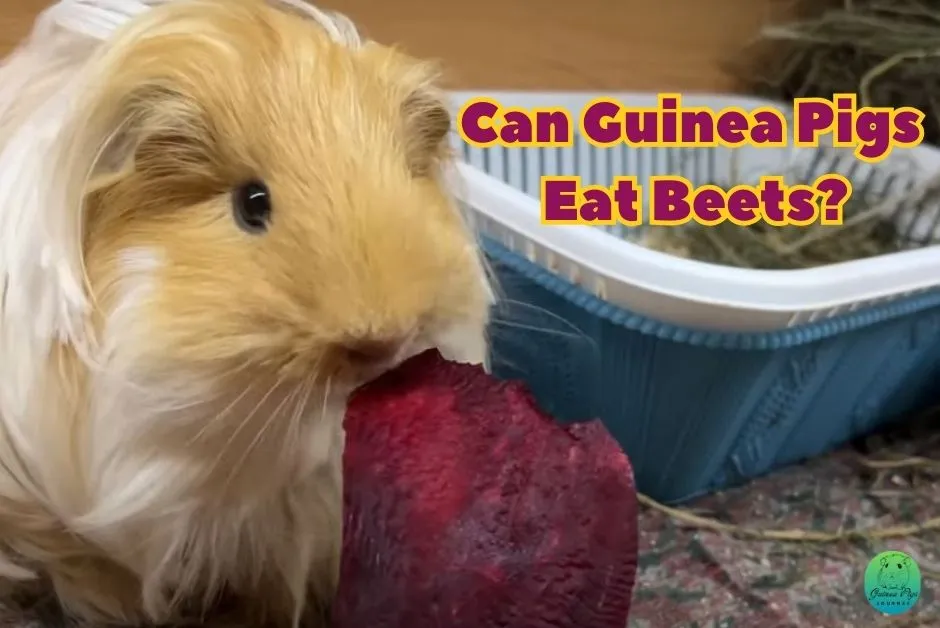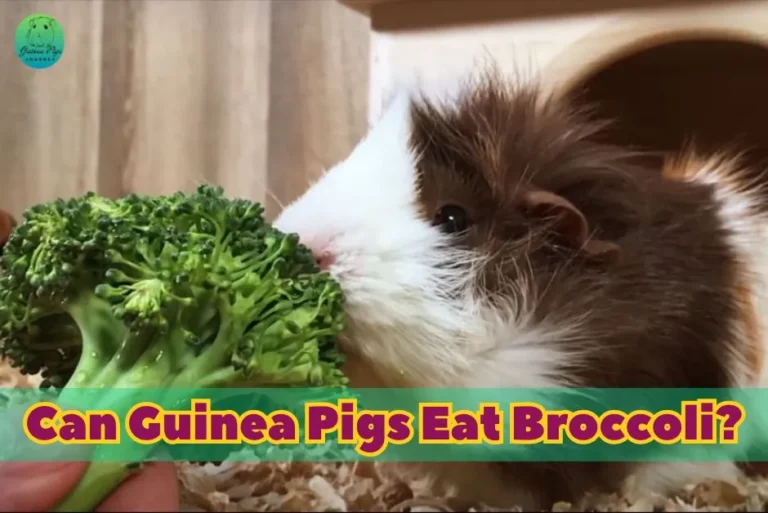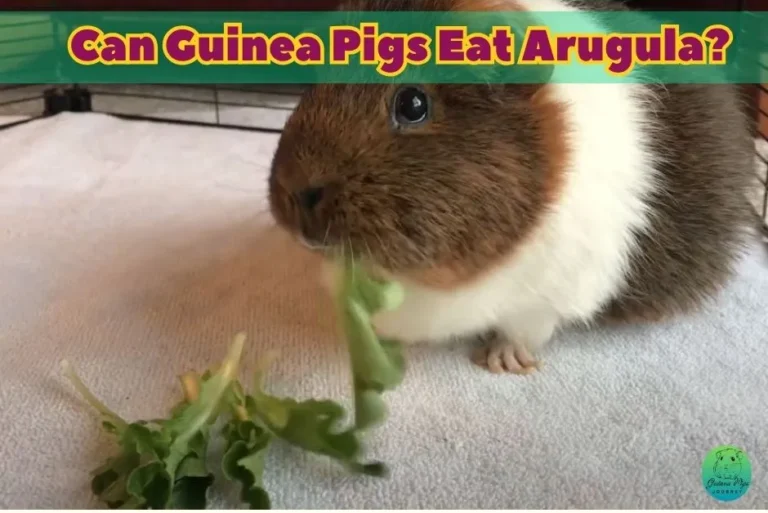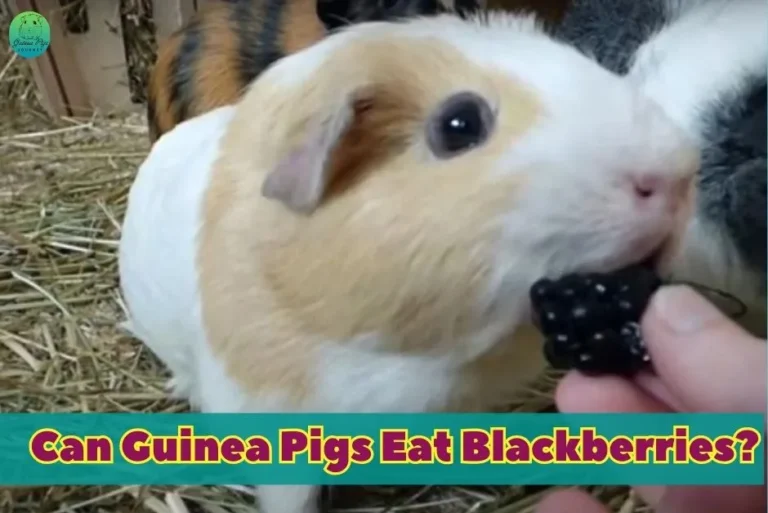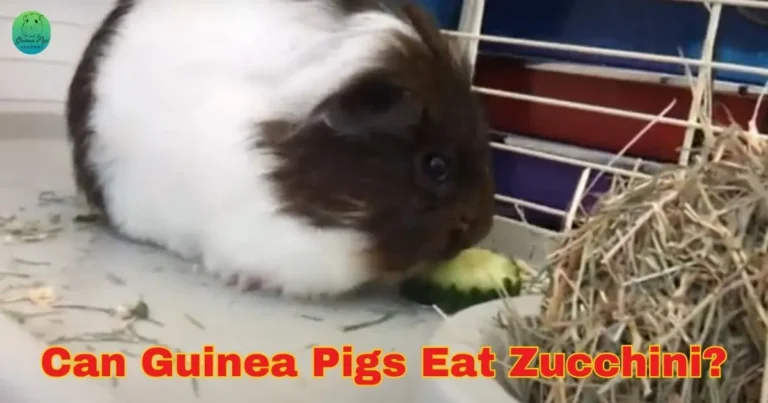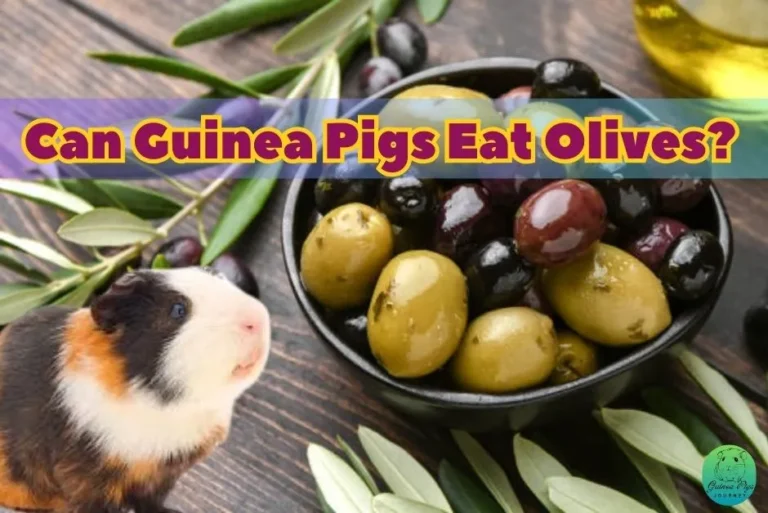Beetroots (Beta vulgaris)! Commonly known as beets, red beet, table beet, dinner beet, garden, or golden beet, have an earthy flavor and aroma and are a great source of fiber, folate (vitamin B9), manganese, potassium, iron, and vitamin C. Many people call them a superfood because of their rich nutritional profile but having cute guinea pigs wonder a question in mind that can guinea pigs eat beets? If Guinea pigs can eat beets, but do they like it?
Yes, Guinea pigs can eat beets in moderation and gradual introduction as raw beets save animals from renal damage, lower blood pressure, and play a key role in growth, development, and heart health. But just like all other fruits and vegetables, there are some risks and drawbacks as well for your guinea pigs. So, always do thorough research before deciding to offer any new food including beets for guinea pigs.
Don’t worry at all, after a long guinea pig journey, experience, and thorough research about beets for guinea pigs, I have made your ways easy to read this article and decided to share whether or not guinea pigs eat beets. And what part of beets can guinea pigs eat? What are the risks and drawbacks of beets for guinea pigs as well as nutritional benefits, serving, and more about beets for guinea pigs?
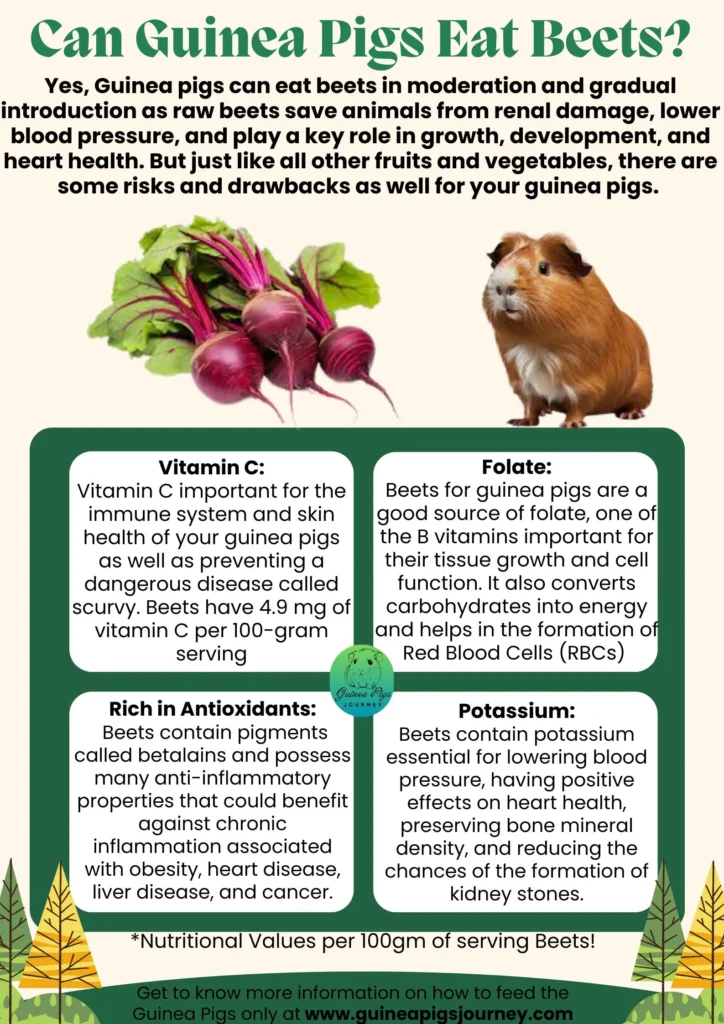
Nutritional Requirements of Guinea Pigs:
Guinea pigs require great care while feeding and the best way of feeding is very necessary for your guinea pigs to ensure the optimum nutritional benefits and overall health. To do so, it is very important to offer the recommended and best diet in your guinea pig diet plan.
In general, Guinea pigs require good and fresh quality hay which makes up 80-90 % of most of their diet along with 10 % of fresh and good quality fruits and vegetables such as sugar snap peas, broccoli, asparagus, arugula, dandelions, basil, rosemary, pears, honeydew melon, pomegranate, cherries, etc. as a treat in moderation.
Guinea pigs can also be served with some amount of only dedicated guinea pig pallets but it should not be part of their main staple and should be served the recommended portion or mentioned on pallets bag for guinea pigs. Guinea pigs should also be served with fresh, clean, chlorine-free drinking water at all times and must be checked and changed twice a day for their good health.
The list of safe foods including beets for guinea pigs that can be fed is so long that needs great care and understanding but not all foods like olives, cheerios, jalapenos peppers, pickles, meat, etc. your guinea pigs eat are safe and some are toxic and harmful to their health as well. So, you must also know about those foods not recommended to feed guinea pigs for a safe and healthy life.
Beets for guinea pigs can be a healthy and nutritious addition if served in moderation. It is pertinent to mention that before deciding to introduce any new food like beet greens and beets for guinea pigs you must know the nutritional analysis of all parts of beets for guinea pigs so that an owner can decide on the quantity and portion of serving as well as the values and percentage of nutrients available with beet greens and beets for guinea pigs to ensure moderation.
Nutritional Analysis of Beet Greens and Beets for Guinea Pigs:
According to the USDA food database, Beetroots for guinea pigs are packed with essential nutrients and are a great source of fiber, folate (vitamin B9), manganese, potassium, iron, and vitamin C. Listed below are the nutritional values and percentages per 100 grams of raw beets for guinea pigs to understand the values and percentages of these important nutrients beets and beet greens contain for guinea pigs and how much is required for your lovely pets for optimum health benefits.
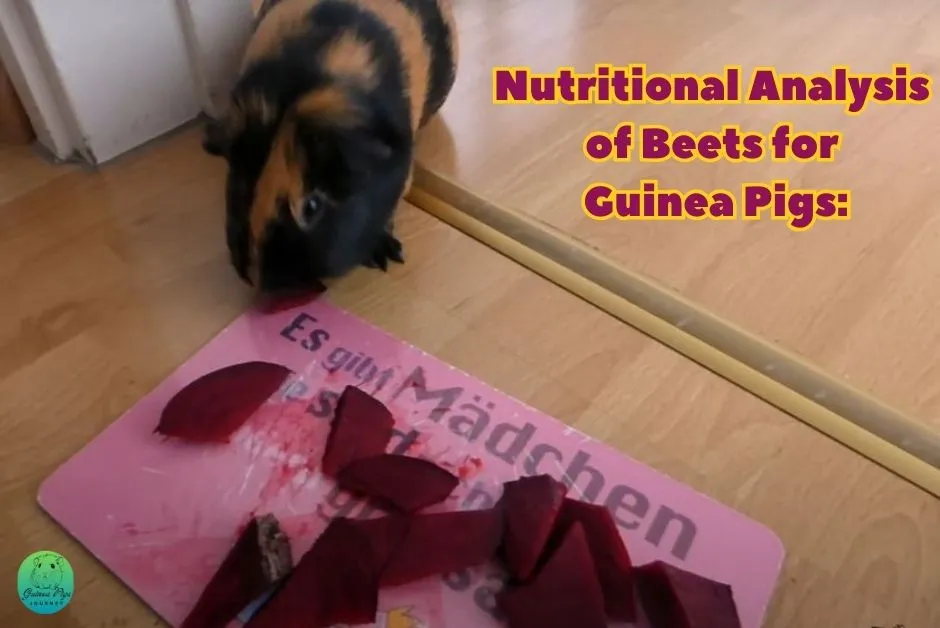
| Nutrients | Beets / 100 gm. | Beet greens / 100 gm. |
| Calories | 45 kcal | 22 kcal |
| Carbohydrates | 8.79 grams | 4.33 grams |
| Water | 88.2 grams | 91 grams |
| Fat | 0.3 gram | 0.13 gram |
| Protein | 1.69 grams | 2.2 grams |
| Dietary Fiber | 3.1 grams | 3.7 grams |
| Sugar | 5.1 grams | 0.5 grams |
| Net Carbs | 6.76 grams | 6.76 grams |
| Ash | 1.06 grams | 2.33 grams |
| Vitamin C, total ascorbic acid | 4.9 mg | 30 mg |
| Vitamin A, RAE | 2 µg | 316 µg |
| Vitamin K | 0.2 µg | 400 µg |
| Vitamin B6 | 0.067 mg | 0.106 mg |
| Fatty Acid | 0.027 g | 0.02 g |
| Calcium, Ca | 16 mg | 117 mg |
| Phosphorus, P | 40 mg | 41 mg |
| Potassium, K | 325 mg | 762 mg |
| Iron, Fe | 0.80 mg | 2.57 mg |
| Magnesium, Mg | 23 mg | 70 mg |
| Manganese | 0.329 mg | 0.391 mg |
| Zinc, Zn | 0.35 mg | 0.38 mg |
| Sodium, Na | 78 mg | 226 mg |
| Copper, Cu | 0.07 mg | 0.191 mg |
| Folate | 109 µg | 15 µg |
Are Beets Safe For Guinea Pigs?
Yes, beets and beet greens are safe to feed your guinea pigs in moderation and with a gradual introduction. They are low in calories yet high in valuable vitamins and minerals as well as offer numerous health benefits. Overfeeding beets for guinea pigs can be harmful as they also contain a decent amount of calcium, sugar, and phosphorus and cause many health-related issues. Ensuring moderation is very crucial when offering any parts of beets including beet greens, beet tops, and stalks to get optimum nutritional benefits.

Let’s quickly go through some important nutrients and health benefits of feeding beets and beet greens to your guinea pigs:
Vitamins:
Beet greens and beets for guinea pigs are a great source of many healthy vitamins such as Vitamin C, K, & A that play a key role in the overall growth, development, and heart health of guinea pigs.
Beet greens and beets for guinea pigs offer vitamin C a well-known antioxidant that is important for the immune system and skin health of your guinea pigs as well as preventing a dangerous disease called scurvy which may even lead to malnutrition. Beet greens contain 30 mg whereas beets have 4.9 mg vitamin C per 100-gram serving.
Vitamin K for guinea pigs plays a key role in the synthesis of proteins required for blood coagulation, and regulation of blood clotting at the time of any injury in guinea pigs which helps in healing those injuries as early as possible, and supports heart health by preventing the hardening of arteries. Beet greens contain 400 µg whereas beets have 0.2 µg vitamin K per 100-gram serving.
Vitamin A helps guinea pigs with the development and growth of cells and the overall body would help them in working of heart, lungs, and other organs properly. Overall, Vitamin A boosts the immune system of guinea pigs. Beet greens contain 316 µg whereas beets have 2 µg vitamin A per 100-gram serving.
Folate:
Beet greens and beets for guinea pigs are a good source of folate, one of the B vitamins important for their tissue growth and cell function. It also converts carbohydrates into energy and helps in the formation of Red Blood Cells (RBCs). Pregnant guinea pigs at the infant stage require more folate to perform well. Beets for guinea pigs are a more abundant source i.e. 109 µg than that beet greens i.e. 15 µg.
Potassium:
Potassium for guinea pigs is essential for lowering blood pressure, having positive effects on heart health, preserving bone mineral density, and reducing the chances of the formation of kidney stones. Potassium is also very useful for nerve and muscle function to maintain good health at whatever stage guinea pigs are. Potassium also regulates the heartbeat and oxygen support for guinea pigs and helps in the creation of proteins and carbohydrates in humans as well as animals. Beet greens for guinea pigs are a more abundant source i.e. 762 mg than the beets i.e. 325 mg per 100-gram serving.
Antioxidants:
Beet greens and beets contain pigments called betalains which possess many anti-inflammatory properties that could benefit many health aspects as chronic inflammation has been associated with conditions like obesity, heart disease, liver disease, and cancer. One study also suggests beets are also shown to reduce kidney infection and inflammation in rats, so seem to be a better option for guinea pigs being rodents as well in moderation. Beets are also ranked as one of the 10 most potent antioxidant vegetables.
Dietary Fiber:
Beet greens and Beets for guinea pigs having sensitive digestive systems are a good source of fiber, which benefits their digestive health and reduces the risk of several chronic health conditions including colon cancer, heart disease, and type 2 diabetes.
What Are The Risks Of Beet Greens And Beets For Guinea Pigs?
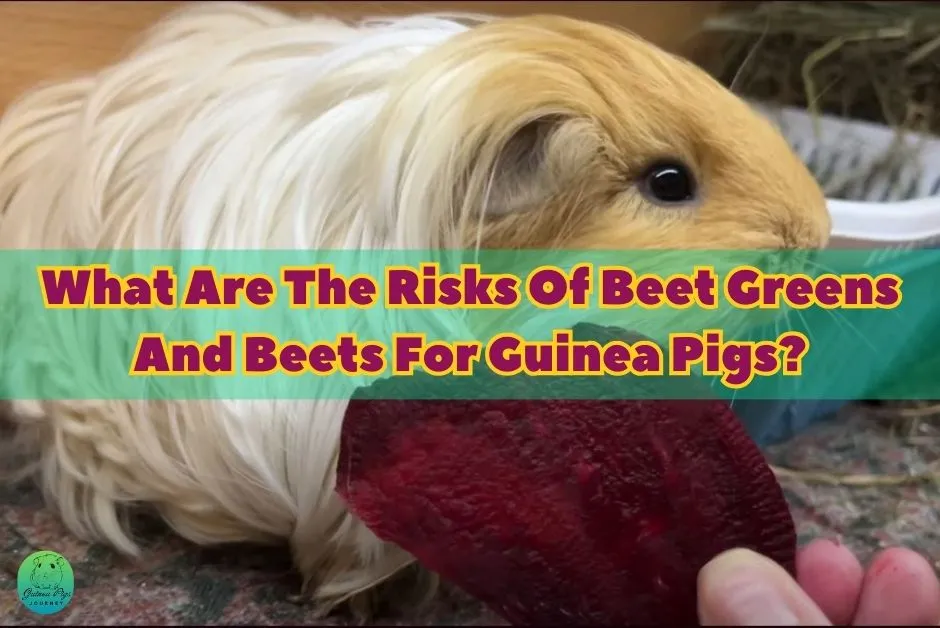
Formation of Kidney Stones:
Beet greens have much higher levels of oxalates than the beets for guinea pigs which can contribute to the formation of kidney stones. Levels of oxalates are much higher in the leaves than in the root itself, but the root is nevertheless considered high in oxalates. So, it is very necessary to ensure moderation while offering beet greens and beets as well in the guinea pigs’ diet.
Formation of Bladder Stones:
Beet greens and beets for guinea pigs also contain a moderate amount of calcium as well which if over-consumed or offered daily can contribute to the formation of bladder stones and sludge in them that would be very painful for your guinea pigs.
Diarrhea:
Guinea pigs have a very sensitive digestive system which makes to think about any new food you are deciding to introduce into guinea pigs’ diet. Overconsumption of Beet greens or beets for guinea pigs can cause diarrhea which can be fatal for them and can lead to dehydration. So ensure moderation while feeding beet greens or beets to avoid any health complications.
Gastric Upset:
Excessive feeding of beets may also cause gastric upset in guinea pigs causing bloating, vomiting, and stomach upset which would directly affect the overall health of guinea pigs.
Allergic Reaction:
Individual guinea pig preferences may differ some may dislike beets or beet greens in their diet which may cause allergic reactions if not monitored before offering. So, one important concern for guinea parents is also observing and monitoring their guinea pigs’ reactions or any kind of allergic signs while offering any new food including beets or beet greens.
Pesticides and Chemicals:
Beets can have some pesticides unwanted chemicals, and fertilizers sprayed during harvesting and in stores. It is recommended to thoroughly wash the beets and beet greens or any part you are going to feed your pet. It is also recommended that buy beets for guinea pigs from any verified dealer or store having a non-GMO label to ensure a safe product for your guinea pigs.
How Often Can Guinea Pigs Eat Beets? (Frequency and Size of Serving Beetroots)
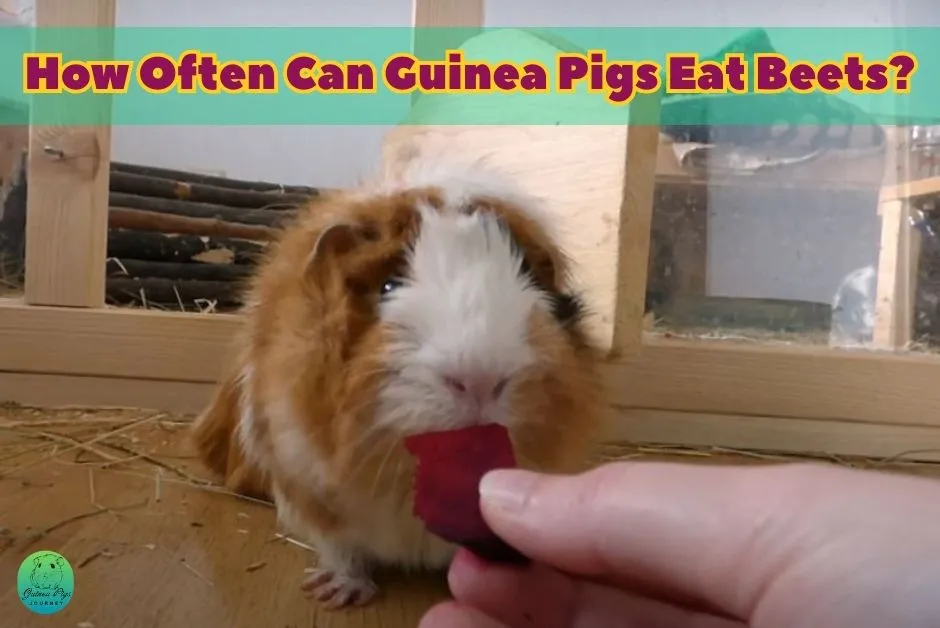
Beet greens and Beets for guinea pigs are not the food being served daily or not the part of main staple, so it is very important to note that you should feed them as an occasional treat in moderation. The recommended frequency of feeding beet greens and beets for guinea pigs is only one or twice a week at most to limit their consumption of beets.
How Much Beetroots Can A Guinea Pig Eat?
The recommended serving size is not more than about 100 grams at a time i.e. almost one or two quarter-inch slices of an average-sized beet per guinea pig. It depends on the individual preference of your guinea pigs and how they eat it, some prefer to eat the beets in pre-shredded form whereas others would love to nibble the chunks or slices, so it is up to your guinea pig preference.
You can also serve ½ amount in the morning and the other half in the evening by mixing it with other suitable vegetables and leafy greens like mustard greens, butternut squash, cilantro, green beans, radicchio, romaine lettuce, etc. in moderation and in small quantities to add a nutritional boost and variety to their diet.
Can Guinea Pigs Eat Beets Every Day?
No, beets are not a vegetable that can be served daily or as a regular diet, so do not offer beets and beet greens to your guinea pigs every day as they contain oxalate, calcium, phosphorus, and sugar which can contribute too many health risks and complications due to overconsumption. It is recommended to feed beets and beet greens as an occasional treat in moderation to ensure the good health of your guinea pigs.
Can Guinea Pigs Eat Beet Greens or Beet Tops?
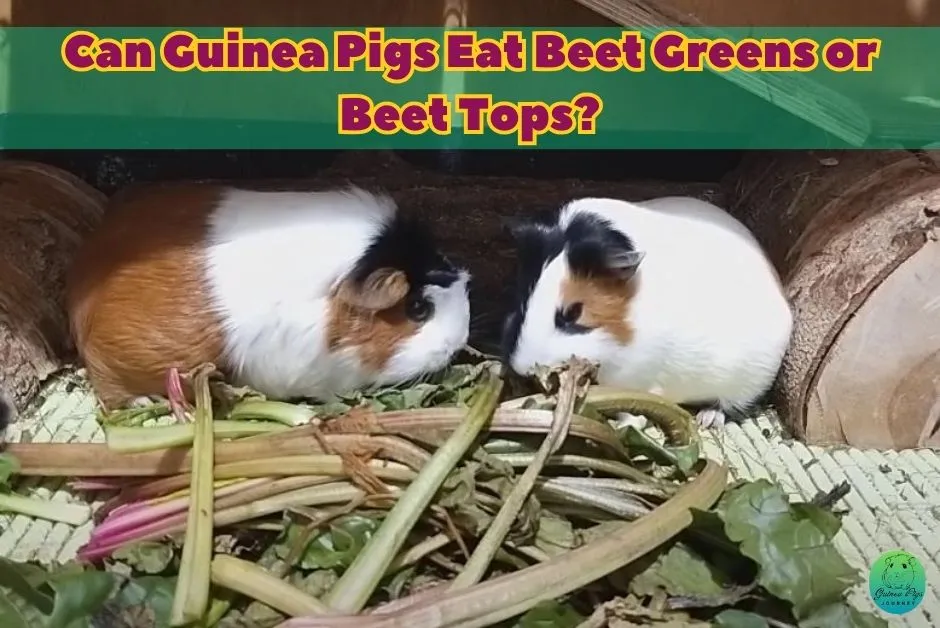
Yes, guinea pigs can eat beet greens or beet tops in moderation as these are also a great and more abundant source of vitamins and minerals than beets but contain much oxalate and calcium as well as sodium that the beets that can lead to the formation of kidney and bladder stones, which makes it a limited option for guinea pigs diet. So, it is recommended to feed beet greens and beet tops in moderation not more than an inch-sized stalk or a single leaf when feeding along with the beetroot.
Can Guinea Pigs Eat Beets Stalks?
Yes, beet stalks are safe to feed your guinea pigs but moderation and gradual introduction are very necessary while offering the stalk part of beetroot because it contains more oxalate and calcium than the beetroot which can cause bladder or kidney stones.
Can Guinea Pigs Eat Beets Leaves?
Yes, beet leaves also known as beet greens or beet tops are safe to feed your guinea pigs in moderation as stated above.
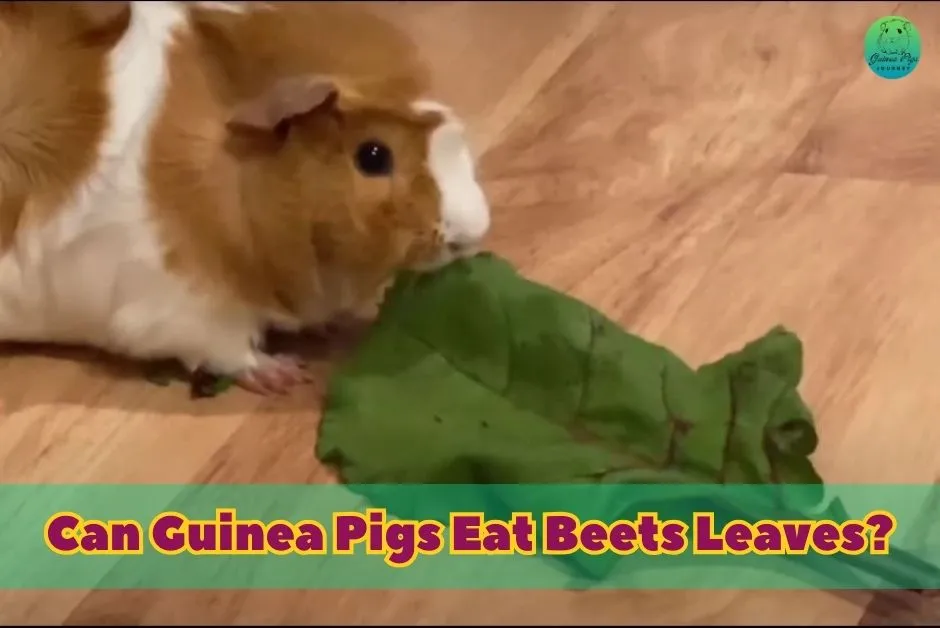
Can Guinea Pigs Eat Beets Seeds?
No, so do not feed the seeds of beets to your guinea pigs as it can cause choking hazards for them. Guinea pigs are so small and sensitive that they can not chew seeds easily which causes some serious hazards for them if choked on.
How To Prepare Beets For Guinea Pigs?
To ensure moderation, it is very crucial to prepare the beets very carefully before serving guinea Pigs. Preparing beets for your guinea pigs is very easy. Here are the simple steps you can follow to prepare beets for guinea pigs:
Can Guinea Pigs Eat Boiled Beets?
No, it is not recommended to offer boiled beets to your guinea pigs because boiling the beets can lose the actual nutrients and can be harmful to the guinea pigs’ digestive system which can cause bloating and diarrhea. So always offer raw and fresh beetroots to your guinea pigs in moderation.
Can Guinea Pigs Eat Cooked or Processed Beetroots?
No, guinea pigs should not be served with cooked or processed beetroots in any case because cooking or processing can harm or kill many nutrients that beet holds for your guinea [pigs. Cooked beets are also added with salts, oil, spices, preservatives, etc. which is very harmful to your guinea pigs’ digestive system and can upset their stomach.
Can Guinea Pigs Eat Pickled Beetroots?
No, do not feed your guinea pigs with pickled beetroots because it contains other harmful additives and ingredients like syrup, flavor, citric acid, etc. which can affect their health and can be harmful to their overall health.

Can Guinea Pigs Eat Canned Beets?
No, canned beets for guinea pigs are not a healthy option because they go through processing and contain some additives, sugar, syrup, chemicals, flavors, etc. which are dangerous for guinea pigs’ sensitive digestive systems causing diarrhea and constipation leading to dehydration. So, Raw and fresh beets for guinea pigs are the safe and best option in moderation.
Can Baby Guinea Pigs Eat Beets?
It is best to avoid feeding beets to Baby guinea pigs (Pups) because beets are high in sugar and fiber which baby guinea pigs cannot tolerate easily leading to serious complications.
You can start offering the beets to baby guinea pigs at the age of almost 4-6 weeks old with gradual introduction and a small quantity in start to check their reaction. Remember, introduce the beets gradually and see their reaction. If you observe any change or reaction, immediately run to the veterinarian for guidance and a check-up.
Alternates of Beets for Guinea Pigs:

Although, Guinea pigs’ primary diet is Hay, guinea pigs’ pallets, veggies, and fruits. But offering a variety of safe fruits and veggies for guinea pigs’ diet is also important. Guinea pigs may like or dislike the beets in their diet as an individual preference, but there must be healthy alternatives to gain the beneficial nutrients. Listed below are the healthier options you may consider for guinea pigs in moderation.
| Bell peppers | Swiss Chard | Grapefruit | Pomegranate | Pumpkin seeds |
| Dragon Fruit | Jicama | Plums | Mushrooms | Wheatgrass |
| Parsley | Cherries | Apricots | Nectarines | Dill |
| Pears | Okra | Blackberries | Raspberries | Bok Choy |
Conclusion: Beets for Guinea Pigs
Overall! It is OK to feed beets and beet greens to your guinea pigs in moderation and with gradual introduction. However, excessive feeding of beets and beet greens can cause digestive issues as well as the formation of bladder or kidney stones due to the high oxalate and calcium content in beet greens.
Serve no more than a small slice of beetroot or 1-2 beet greens at a time. Overall, if you are unsure about the frequency and size of serving beets discuss it with your veterinarian for the best guidance on beets and beet greens for your lovely pets. It is important to note that do not worry about the pink pee by your guinea pigs after feeding beet as it is not harmful so do not be alarmed.
Always remember that the main staple part of your guinea pig’s diet is hay. Vegetables are just supplements or to be served as a treat for nutrients that guinea pigs need in addition to whatever they get from foraging hay.

